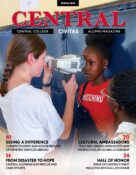
Rick Ryan ’70 will be executive-in-residence this fall, teaching Central students how to live like entrepreneurs.
President Mark Putnam remembers hearing about a women’s prison that was teaching entrepreneurial skills to its inmates. “How many of them actually start a business when they leave prison?” he asked the instructor. “Almost none,” the instructor replied. “But we think the skills they learn being an entrepreneur will give them a skill set that will help them break out of the system and empower them.”
Which got Putnam to thinking — can we expand the idea of entrepreneurship at Central College to more than just something business majors might be interested in? What if that concept could teach a set of skills that could be applied to any major? And what if these ideas could be put into practice abroad?
This fall Central will introduce the executive-in-residence program, funded by the Martin Heerema Endowment for Entrepreneurship. Rick Ryan, a 1970 alumnus who has spent most of his career in life sciences — most recently in drug and pharmaceutical development at Millipore Corporation near St. Louis — will be visiting campus periodically, teaching classes and meeting with students to explore what being an entrepreneur might look like in different settings.
“Being an entrepreneur takes many skills, whether you’re starting a new for-profit business or a nonprofit business,” Ryan said. “The skills of leadership, planning, working with others and applying concepts can benefit students in any area of study.”
Not Just for Business Majors
That’s why Ryan is just as excited to work with a theatre student who wants to explore getting community theatre started in her hometown as he is about the student who wants to develop a new product and market it. He has a special interest in social entrepreneurship — using business skills to help those who need it. “Starting a business may be the underpinnings of being an entrepreneur, but we’re going to take aim at the concept of being a social entrepreneur,” he said.
The executive-in-residence program will be a perfect fit with what’s already happening on campus. Jamie Gyolai, an adjunct instructor of business at Central with experience as an entrepreneur, has been teaching introductory classes in entrepreneurship for the past two years. He said he sees new energy coming onto the campus with Ryan’s appointment. “About 50 percent of the students who have taken my class are not business majors,” he said. “We’re trying hard to get art majors and history majors to see the skills we’re teaching here apply to them, too.”
Getting students out of the classroom and connected through networking are important components of the executive-in-residence program. “It’s not just Rick’s personal experience and knowledge that are going to make him valuable,” Gyolai said. “He’s got incredible connections and networks, and that’s going to open up a world of opportunities for our students.”
Taking Entrepreneurship Abroad
Putnam and Ryan see far-reaching effects for the entrepreneurship program, whether that means a student opens his own business on campus or a group of students get together to begin a non-profit that funds charities or private organizations. While these could certainly be worked on at Central’s Pella campus, Putnam said he sees a perfect tie-in with Central College Abroad.
“Would it be possible in Merida to start a program that would be taken up by successive groups of students?” he asked, thinking aloud. “Could we partner with organizations in that community? Could we bring in students from other colleges? It’s about creating authentic experiences in the countries we have students in, not just academic tourism.”
The idea of serving others is not a new concept for Central students, Putnam said. Many come in already as freshmen with a background in mission trips, service days and other ways they’ve helped in their communities around the country and abroad. “We could think of a program like this being the spirit of an internship combined with the spirit of service,” Putnam said. “When we put together academic classes, an entrepreneurial spirit and international experience, we’re going to have students who walk into companies better prepared.”
But perhaps more importantly, the program will give students the tools to apply entrepreneurial principles to their own lives. “Classroom experience is critical, but when we apply the experience, we place an exponent on it,” Putnam said. “We’ve given them a world where they’ve done it, not just read and studied about it.”












To encourage serious, intellectual discourse on Civitas, please include your first and last name when commenting. Anonymous comments will be removed.
Comments are closed.